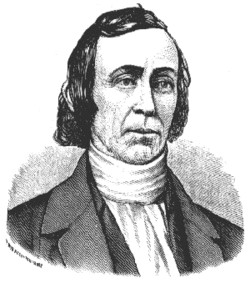Rev. John Winebrenner – Uncompromising Opponent of Human Slavery
Posted By Norman Gasbarro on March 26, 2018
Rev. John Winebrenner was a Reformed minister who broke with his denomination over among other things, the issue of human slavery, on which he was an uncompromising opponent. His views surely were known in the Lykens Valley in the days before the Civil War began. He died on 12 September 1860 and is buried in the Harrisburg Cemetery.
A biographical sketch of him appeared in the Commemorative Biographical Encyclopedia of Dauphin County:
Rev. John Winebrenner was born in Frederick County, Maryland, 24 March 1797. He was partly educated at the Glades School in Frederick, and partly at Dickinson College, Carlisle. He studied for the ministry under the Rev. Mr. Helfenstein, in Philadelphia, and was ordained by the Potomac Synod of the Reformed Church in September 1820, at Hagerstown.
That year he was called to the Salem Church at Harrisburg, at the same time ministering to Shoop’s, Wenrick’s and the Freiden’s churches in the neighborhood.
It was during his pastorate that the present church edifice, Third and Chestnut Streets, was erected. Mr. Winebrenner ministered here from 22 October 1820 to 23 March 1823, when owing to his religious views on revivals, Sunday Schools, anti-slavery and the temperance movement, with the allowing of non-ordained persons to preach in his pulpit, becoming obnoxious to his congregation, a separation took place. In a number of pamphlets he issued, Mr. Winebrenner vigorously defended his principles from the attacks made right and left by his opponents, and he did not cease therefore “to preach the word.” Subsequently, his energies were devoted to the establishment of a new denomination, called by him the Church of God, but known in early years as Winebrennarians. He met with remarkable success, and although but fifty years have passed since the Rev. John Winebrenner promulgated the doctrines of baptism by immersion and the washing of feet, the ministers of that church number probably five hundred, and the membership well on to sixty thousand.
Mr. Winebrenner was the author of a number of religious and controversial works, those on “Regeneration,” “Brief Views of the Church of God,” and a volume of “Practical and Doctrinal Sermons” being the more important. He edited for several years the Gospel Publisher, now the Church Advocate. In the early years of his ministry he was an uncompromising opponent of human slavery. The Rev. Mr. Winebrenner died at Harrisburg, on 12 September 1860, at the age of sixty-three. Over his remains in the Harrisburg Cemetery, the denomination have erected a handsome monument.
The Archives at Dickinson College has also posted a biographical sketch of him which includes the following:
Winebrenner began his ministry soon after, being appointed pastor of four churches in the Harrisburg area. His enthusiastic style, which included favor of revivals and outdoor services, tolerance for neighboring Methodist pastors, and vigorous preaching against theatres, balls, lotteries, gambling, horse racing and, above all, slavery, soon caused dissention within his congregation. By March 1823 he had been locked out of his church – the Stone Church in Shiremanstown – by his own flock and had become estranged from his Synod. In September 1828 he was removed from the Reformed Church.
He continued to preach, however, and by October 1830 had founded his own conservative evangelical denomination he called the “Church of God.” Around six feet tall and an impressive orator, his sect grew in the Harrisburg area. He also became very active in the anti-slavery movement and aided in forming the first Anti-Slavery Society of Harrisburg in January 1836, represented it at the State Convention, and later served as its Corresponding Secretary.
Finally, the United Church of Christ has published a more detailed biographical sketch which goes into greater depth on his anti-slavery views. Some selections follow here:
Like many other religious leaders of American history during “the Second Great Awakening,” Winebrenner considered moral and social reform a natural concern of the church. He believed that the best way to effect a better society was through moral suasion of persons, not through political action. Among the reform movements he supported were antislavery, temperance, and peace.
His first antislavery activity was supporting the colonization movement, an effort to establish African colonies for freed slaves. Like many other nineteenth century reformers, he eventually became dissatisfied with this effort and joined the abolitionist movement. He became the manager of the newly formed Harrisburg Anti-Slavery Society in 1836 and later was elected corresponding secretary. Speaking for the Church of God in 1844, he said that it “believes the system or institution of slavery to be impolitic and un-Christian.”
In his espousal of reform views on slavery, temperance, and peace, Winebrenner often ran counter to the popular opinion of the nation and even the Church of God. It took time before the members of the denomination accepted his reform positions as their own. For example, in 1857, when Winebrenner urged a more tolerant attitude toward slaveholders, with the hope of persuading them of the evils of slavery and preventing a civil war, he was loudly condemned for his views by church leaders….
John Winebrenner was at times idealistic and unbending, but he was also practical. Perhaps our greatest affinity with him can be that amid all the controversies and problems surrounding his life, he took time to speak out for peace and justice.
 ;
;



Comments